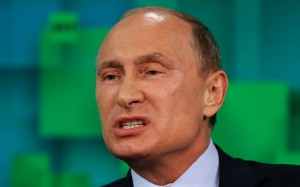The president of the Los Angeles World Affairs Council challenges critics of President Obama’s Ukraine policy by saying, “What are you going to do, send the 101st Airborne into Crimea?” Not exactly subtle. And rather silly, considering that no one has proposed such a thing.
The alternative to passivity is not war but a serious foreign policy. For the past five years, Obama’s fruitless accommodationism has invited the kind of aggressiveness demonstrated by Iran in Syria, China in the East China Sea and Russia in Ukraine. But what’s done is done. Put that aside. What is to be done now?
We have three objectives. In ascending order of difficulty: Reassure NATO. Deter further Russian incursion into Ukraine. Reverse the annexation of Crimea.
Reassure NATO:
We’re already sending U.S. aircraft to patrol the airspace of the Baltic states. That’s not enough.
●Send the chairman of the Joint Chiefs to the Baltics to arrange joint maneuvers.
●Same for the four NATO countries bordering Ukraine — Poland, Slovakia, Hungary and Romania.
●Urgently revive the original missile-defense agreements concluded with Poland and the Czech Republic before Obama canceled them unilaterally to appease Russia. (But first make sure that the respective governments are willing to sign on again after Obama left them hanging five years ago.)
Deter Russia in Ukraine:
● Extend the Black Sea maneuvers in which the USS Truxtun is currently engaged with Romania and Bulgaria. These were previously scheduled. Order immediate — and continual — follow-ons.
● Declare that any further Russian military incursion beyond Crimea will lead to a rapid and favorable response from NATO to any request from Kiev for weapons. These would be accompanied by significant numbers of NATO trainers and advisers.
This is no land-war strategy. This is the “tripwire” strategy successful for half a century in Germany and Korea. Any Russian push into western Ukraine would then engage a thin tripwire of NATO trainer/advisers. That is something the most rabid Soviet expansionist never risked. Nor would Putin. It would, therefore, establish a ring of protection at least around the core of western Ukraine.
Reverse the annexation of Crimea:
Clearly the most difficult. In the short run, likely impossible. There are no military cards to play, Russia holding all of them. Ukraine’s forces are very weak. The steps must be diplomatic and economic.
First, Crimean secession under Russian occupation must lead to Russia’s immediate expulsion from the G-8. To assuage the tremulous Angela Merkel, we could do it by subtraction: All seven democracies withdraw from the G-8, then instantly reconstitute as the original G-7.
As for economic sanctions, they are currently puny. We haven’t done a thing. We haven’t even named names. We’ve just authorized the penalizing of individuals.
Name the names, freeze their accounts. But any real effect will require broader sanctions and for that we need European cooperation. The ultimate sanction is to cut off Russian oligarchs, companies and banks from the Western financial system. That’s the economic “nuclear option” that brought Iran to its knees and to the negotiating table. It would have a devastating effect on Putin’s economy.
As of now, the Germans, French and British have balked. They have too much economic interest in the Moscow connection.
Which means we can do nothing decisive in the short or even medium term. But we can severely squeeze Russia in the long term.
How? For serious sanctions to become possible, Europe must first be weaned off Russian gas. Obama should order the Energy Department to expedite authorization for roughly 25 liquified natural gas export facilities. Demand all decisions within six weeks. And express major U.S. support for a southern-route pipeline to export Caspian Sea gas to Europe without traversing Russia or Ukraine.
Second, call for urgent bipartisan consultation with congressional leaders for an emergency increase in defense spending, restoring at least $100 billion annually to the defense budget to keep U.S. armed forces at current strength or greater. Obama won’t do it, but he should. Nothing demonstrates American global retreat more than a budget that reduces the U.S. Army to 1940 levels.
Obama is not the first president to conduct a weak foreign policy. Jimmy Carter was similarly inclined — until Russia invaded Afghanistan, at which point the scales fell from Carter’s eyes. He responded boldly: imposing the grain embargo on the Soviets, boycotting the Moscow Olympics, increasing defense spending and ostentatiously sending a machine-gun-toting Zbigniew Brzezinski to the Khyber Pass, symbolizing the massive military aid we began sending the mujahideen, whose insurgency so bled the Russians over the next decade that they not only lost Afghanistan but were fatally weakened as a global imperial power.
Invasion woke Carter from his illusions. Will it wake Obama?
. . . . . . . . . . . . . . . . . . . .
Charles Krauthammer is a columnist at The Washington Post.
